
Apidae is the largest family within the superfamily Apoidea, containing at least 5700 species of bees. The family includes some of the most commonly seen bees, including bumblebees and honey bees, but also includes stingless bees, carpenter bees, orchid bees, cuckoo bees, and a number of other less widely known groups. Many are valuable pollinators in natural habitats and for agricultural crops.
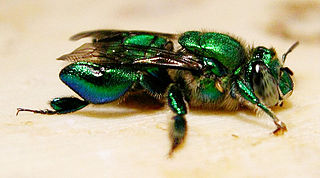
Euglossa is a genus of orchid bees (Euglossini). Like all their close relatives, they are native to the Neotropics; an introduced population exists in Florida. They are typically bright metallic blue, green, coppery, or golden.

Triepeolus is a genus of cuckoo bees in the family Apidae. There are at least 140 described species in Triepeolus. The majority of species whose life history is known are kleptoparasitic in the nests of bees in the tribe Eucerini, especially the genera Melissodes and Svastra.

Triepeolus kathrynae is a species of cuckoo bee in the family Apidae. It is found in Central America and North America.

Epeolus pusillus, the cuckoo bee, is a species of cuckoo bee in the family Apidae. It is found in Central America and North America.

Epeolus mesillae is a species of cuckoo bee in the family Apidae.
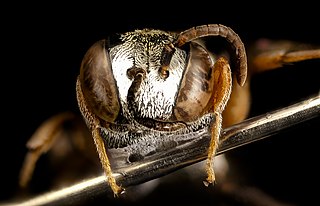
Epeolus howardi, or Howard's cellophane-cuckoo bee, is a species of cuckoo bee in the family Apidae. It is found in North America.
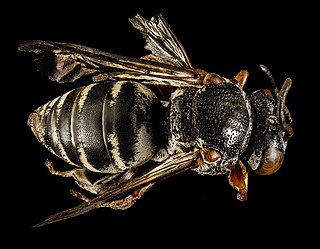
Epeolus lectoides, the cuckoo bee, is a species of cuckoo bee in the family Apidae. It is found in North America. Hosts include Colletes latitarsis and Colletes nudus.

Triepeolus simplex is a species of cuckoo bee in the family Apidae. It is found in North America.

Triepeolus concavus is a species of cuckoo bee in the family Apidae. It is found in Central America and North America.

Epeolus carolinus is a species of cuckoo bee in the family Apidae. It is found in North America.

Triepeolus pectoralis is a species of cuckoo bee in the family Apidae. It is found in North America.
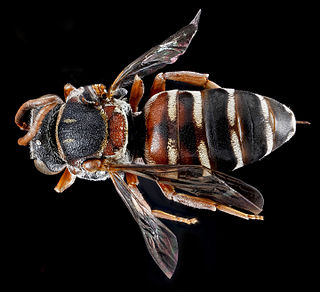
Epeolus zonatus is a species of cuckoo bee in the family Apidae. It is found in North America.
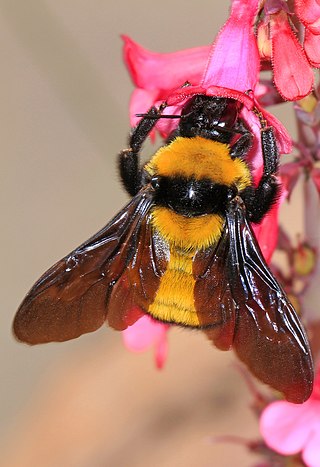
Bombus sonorus, commonly known as the Sonoran bumble bee, is a species of bumble bee in the family Apidae. It is found in Central America and western and southwestern North America. Considered uncommon, it is sometimes categorized as a subspecies of Bombus pensylvanicus.

Epeolus olympiellus is a species of cuckoo bee in the family Apidae. It is found in North America.

Triepeolus brittaini is a species of cuckoo bee in the family Apidae. It is found in North America.

Bombus californicus, the California bumble bee, is a species of bumble bee in the family Apidae. Bombus californicus is in the subgenus Thoracobombus. It is found in Central America and the western half of North America. Bombus californicus is classified as Vulnerable by the IUCN.

Triepeolus lunatus is a species of cuckoo bee in the family Apidae. It is found in North America from Canada to northern Mexico. Triepeolus lunatus tends to live in forest edges and meadows.

Triepeolus mexicanus is a species of cuckoo bee in the family Apidae. It is found in Central America and North America.

Ceratina dupla, the doubled ceratina, is a species of small carpenter bee in the family Apidae. It is found in the eastern half of North America. It was formerly confused with the species Ceratina floridana and Ceratina mikmaqi, until molecular analyses demonstrated significant genetic differences between the taxa.


















